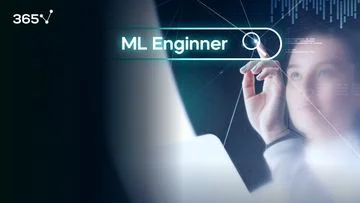Artificial Intelligence (AI) is revolutionizing our world, enabling machines to rival human capabilities and even surpass them in tackling complex tasks with incredible speed and precision.
Imagine a world where computers recognize faces, understand spoken words, play games, and drive cars—all of this is possible in 2024, thanks to the relentless innovation driven by AI professionals.
Curious about how to be part of this revolutionary field? This article will be your step-by-step guide on how to become an AI engineer.
Table of Contents
- Why Should I Consider a Career in AI?
- What is an AI Engineer?
- What Do AI Engineers Do?
- AI Engineer Degrees and Skills
- Step-by-Step Guide: How to Become an AI Engineer
- Landing a Job as an AI Engineer
- How to Become an AI Engineer with 365 Data Science
- FAQs
Why Should I Consider a Career in AI?
The widespread adoption of AI in consumer applications, driven by ChatGPT and similar products, has increased demand for AI engineers to develop and maintain these systems.
AI engineering is one of LinkedIn’s fastest-growing roles in the US in 2024 and is expected to continue expanding. A study by PwC estimates that AI could contribute up to $15.7 trillion to the global economy by 2030.
This massive economic impact means that AI engineer skills will be in demand for years to come.
Along with the high demand, the AI engineer salary is another reason to consider this career. The average total pay for AI engineers in the United States is around $201,000 per year, according to Glassdoor.
This is higher than any other role we have researched this year, showing how lucrative AI is right now for people who have the right skills.
Working in AI also places you at the forefront of technological innovation, with opportunities to impact healthcare, create smarter cities, and even tackle climate change.
Whether you’re interested in finance, entertainment, or art, AI has applications in almost every field, allowing you to combine your AI skills with your passions.
Convinced yet? Let’s take a deeper look into the role and discuss how you can become an AI engineer.
What is an AI Engineer?
An artificial intelligence engineer is someone who designs, builds, and deploys artificial intelligence models and systems.
Here's a breakdown of what AI engineers do:
- Building models: AI developers create algorithms and models that allow computers to learn from data. This could involve machine learning, deep learning, natural language processing, or computer vision.
- Data wrangling: They work with large datasets to train these models. This includes collecting, cleaning, and preprocessing data to ensure it's ready for model training.
- Programming: Proficiency in programming languages like Python is crucial. AI engineers use these languages to write the code that implements AI algorithms.
- Deploying solutions: Once a model is built and trained, AI engineers integrate it into existing systems or create new applications.
What’s the difference between an artificial intelligence developer, a machine learning engineer, and a data scientist? These three job titles are very similar in many ways, but there are a few nuances that set them apart. Here’s a quick comparison of these roles:
|
Aspect |
AI Engineers |
||
|
Focus |
Designing, building, and deploying AI models and systems |
Extracting insights and value from data |
Implementing and optimizing machine learning models |
|
Responsibilities |
· Develop AI models using machine learning and deep learning · Work with large datasets · Integrate AI solutions into systems |
· Analyze and interpret complex data · Build predictive models · Communicate findings · Experiment with new methods |
· Design and develop ML systems · Choose and develop algorithms and tools · Optimize models · Deploy ML models into production |
|
Skills |
· Programming (Python, R) · AI frameworks (TensorFlow, PyTorch) · Cloud platforms (AWS, Google Cloud) |
· Statistical analysis and data visualization · Programming (Python, SQL) · Machine learning algorithms · Data tools (Pandas, NumPy, Scikit-learn) |
· Programming and software engineering · Machine learning algorithms and techniques · ML frameworks (TensorFlow, PyTorch) · Data preprocessing and feature engineering |
|
Overlap |
· Programming · Machine learning knowledge · Data handling · Communication & collaboration |
||
There are also a few variations of the AI engineer role that you may encounter:
- AI specialist: These specialists focus on specific AI technologies or applications, often with deep expertise in a particular area like natural language processing (NLP) or computer vision.
- AI consultant: These professionals provide expert advice to businesses on how to implement AI solutions. They often work on a project basis and may help with the strategy, planning, and execution of AI initiatives.
- AI architect: Architects design the overall AI infrastructure and strategy for an organization, ensuring that all AI components work together efficiently and effectively.
What Do AI Engineers Do?
Now that you understand the general AI engineer job description, the next section of this ‘How to Become an AI Engineer’ guide will take a closer look at AI engineer responsibilities:
Data Preprocessing and Analysis
Before any model can be trained, data must be cleaned and preprocessed. This includes handling missing data, normalizing data sets, and performing feature engineering. These steps are crucial for developing accurate and effective AI models.
While not a critical AI engineer requirement, these professionals can be involved in the data cleaning and preparation process. Understanding data's intricacies helps them select the right features and apply suitable machine learning algorithms.
In smaller companies or startups, AI engineers might manage the entire data pipeline, from collection to model deployment—including data wrangling. In larger organizations, specialized teams might handle these tasks, allowing AI engineers to focus on model development and implementation.
Implementing Machine Learning Algorithms
When you think of AI engineer skills, the first things that may come to mind are specialized AI algorithms, such as GPT-3 and other foundation models. But AI engineers also need a solid understanding of traditional machine learning algorithms.
AI developers implement a variety of ML algorithms to create models that can learn from data. This involves understanding different types of models, their applications, and how to optimize them for better performance.
This step is critical before moving on to more complex AI models.
Designing and Developing AI Models
Creating advanced AI models is one of the core AI engineer requirements. They select appropriate algorithms and frameworks—such as PyTorch for deep learning or large language models like ChatGPT—and code these models to solve specific problems.
Unlike traditional statistical models which are typically used for hypothesis testing and understanding relationships between variables, AI models undertake tasks that require human-like intelligence.
They can handle highly complex and non-linear relationships and improve as they are exposed to more data—enabling functions like image recognition and NLP.
Working with the OpenAI ChatGPT API and Other Foundation Models
A significant part of an AI engineer skills involves integrating powerful AI models, such as the OpenAI ChatGPT API, into products and services.
This includes customizing these models to meet specific needs, managing API interactions, and ensuring seamless integration within existing systems.
Artificial intelligence engineers may also work with other foundation models like BERT for NLP and DALL-E for image generation, leveraging these tools for a variety of applications.
Integrating AI Solutions with Existing Systems
Once AI models are developed and trained, they need to be integrated into existing systems to be useful.
Artificial intelligence developers ensure these AI solutions work well within the broader system architecture, enhancing user experience or operational efficiency. This often involves collaborating with other software developers and IT professionals to ensure smooth deployment and operation.
Now that you understand what AI engineers do, we can get into the question of how to become an AI engineer.
AI Engineer Degrees and Skills
While many AI engineers start with a bachelor’s degree in computer science, data science, mathematics, or a related field, our research shows that employers often value skills over degrees.
Practical experience and a proven track record can be more critical than formal education. Therefore, it's essential to focus on acquiring the right skills and building a strong portfolio.
Here are some key skills required to become an AI engineer:
- Programming Languages
- Mathematics and Statistics
- Machine Learning Algorithms
- Data Preprocessing
- Deep Learning Frameworks
- Natural Language Processing (NLP)
- Computer Vision
- Big Data Technologies
If you're wondering how to get into AI and interested in developing these skills, 365 Data Science offers comprehensive courses in the subjects you need, along with projects to practice and apply your skills. We also provide certificates to boost your resume, which can be especially useful if you are transitioning into AI from another field.
In the next section, we will take a closer look at how to become an AI engineer from scratch—exploring each of the abovementioned skills and how to acquire them effectively.
Step-by-Step Guide: How to Become an AI Engineer
While a formal qualification can provide a strong foundation and may even be required for certain positions, it's not the only AI engineer career path.
Here are 8 steps to becoming an AI engineer from scratch.
Step 1: Learn a Programming Language
According to our research, Python was mentioned in 57% of data scientist job postings in 2024, making it a clear winner when it comes to choosing a programming language.
This is because Python's syntax is simple and readable, making it easier to learn than some languages like Java.
Plus, Python's popularity has led to a rich set of libraries and frameworks specifically designed for AI and machine learning, such as TensorFlow, Keras, PyTorch, Scikit-learn, and pandas.
With our Python Programmer Bootcamp, you will develop a thorough understanding of Python and core concepts related to object-oriented programming—crucial AI engineering skills.
Step 2: Learn the Fundamentals of Computer Science
Initially, focus on the concepts of data structures and algorithms. You should have an in-depth understanding of linked lists, trees, graphs, and hash tables. Then, learn about dynamic programming, greedy algorithms, and graph algorithms.
After, you can move on to computer systems and architecture. This involves understanding how computers process information, including CPU, memory, and I/O fundamentals. This will give you a solid base for understanding more complex AI engineer skills.
Step 3: Understand the Math Behind AI and Machine Learning
A solid understanding of math concepts is beneficial to get an idea of what's going on under the hood—an important foundation for AI developers.
There are three main areas of mathematics and statistics that you should focus on:
|
Mathematical Concept |
Topic |
Details |
|
Vectors and matrices |
Fundamental for understanding data representation and transformations, including concepts like vector spaces, basis, and dimensionality reduction (PCA). |
|
|
Matrix operations |
Involves addition, multiplication, inversion, and understanding eigenvalues and eigenvectors. These are essential for algorithms such as singular value decomposition (SVD) and neural networks. |
|
|
Calculus |
Derivatives and integrals |
Important in AI engineering for understanding the rate of change and the area under curves, which are crucial for optimization algorithms like gradient descent. |
|
Partial derivatives |
Essential for dealing with functions of multiple variables, common in machine learning models. |
|
|
Probability theory |
Covers the basics of probability, conditional probability, Bayes' theorem, and distributions such as Gaussian and Binomial. |
|
|
Descriptive statistics |
Includes measures such as mean, median, mode, variance, and standard deviation. |
|
|
Inferential statistics |
Involves hypothesis testing, confidence intervals, and p-values. It also includes understanding concepts like maximum likelihood estimation (MLE) and Bayesian inference. |
Step 4: Master Machine Learning
Grasp the fundamentals of machine learning for AI engineering—including supervised learning, unsupervised learning, and reinforcement learning. Our machine learning in Python course is a great introduction.
Learn the essential Python libraries such as NumPy for numerical computations, pandas for data manipulation and analysis, Matplotlib and Tableau for data visualization, and Scikit-learn for implementing basic machine learning algorithms. For an introduction to algorithms, check out The Machine Learning Algorithms A-Z.
Another fantastic resource is the book Hands-On Machine Learning with Scikit-Learn, Keras, and TensorFlow by Aurélien Géron. This book will give you a comprehensive overview of the core machine learning concepts and algorithms for AI engineering.
Step 5: Understand the Foundations of Deep Learning
Deep learning can be an intimidating topic. But with a solid foundation from the previous four steps, you should now be able to ease into this crucial aspect of AI engineering.
Our Deep Learning with Tensorflow 2 course is an excellent starting point, as it breaks down complex topics into manageable pieces. When you’re ready, you can move on to more advanced convolutional neural networks.
Start by building a few simple neural networks—don't get stuck in the theory for too long. Deep learning is an extensive, complex area of AI, so don't feel like you need to understand everything right away.
Working on projects and tackling real-world problems will help you make progress quicker. Our hands-on projects will guide you through the full process, from data processing to modeling. Try out our projects while you’re learning to build your confidence, but as a form of feedback to check where the gaps are in your knowledge.
How to become an AI engineer doesn’t just involve learning the skills, but also making sure you know how to apply them in real-life situations.
Step 6: Learn About LLMs
Large language models (or LLMs) are deep learning models trained on massive amounts of text data to understand and generate human-like text.
LLMs are at the forefront of AI research. Knowledge of how these models work, their limitations, and potential areas for improvement can drive innovation and development in AI.
LLMs like GPT-3 and BERT achieve state-of-the-art results in numerous NLP tasks, making them essential tools for any artificial intelligence developer.
Start by taking our introductory course on LLMs. Understand what makes these models tick and how you can use them to create your own applications.
As one of the most popular LLMs available today, you need to know all about OpenAI's ChatGPT and how to properly use its API in your own applications.
Next, work through our Intro to ChatGPT and Generative AI course and start building your own AI-based projects.
Step 7: Learn SQL and Big Data Frameworks
No matter how cutting-edge your AI model is, it means nothing if you can't extract and work with your data.
You should be able to query, update, and manage relational databases with SQL—crucial for handling structured data in AI applications.
But you will also likely need to deal with datasets that are beyond the capability of traditional databases. A big part of how to get into AI is understanding how to handle the volume, variety, and velocity of big data.
The key big data frameworks are:
- Hadoop: A distributed storage and processing framework. Understand its ecosystem, including HDFS (Hadoop Distributed File System) and MapReduce.
- Spark: A fast, general-purpose cluster-computing framework. Focus on its core concepts like RDD (Resilient Distributed Dataset) and its APIs for data processing.
- Hive: A data warehouse software that facilitates querying and managing large datasets in distributed storage.
Step 8: Understand cloud computing
In 2024, cloud computing is a requirement for AI engineers, as it helps you effectively implement AI solutions. The three major cloud providers are Amazon Web Services (AWS), Google Cloud Platform (GCP), and Microsoft Azure.
Choose one cloud provider and follow the structured learning curriculum based on their certification exam. This is the best way to be sure that you are learning the most critical features of the platform and how to best apply those features to AI models.
- AWS Certified Solutions Architect: AWS Certification
- Google Professional Cloud Architect: Google Cloud Certification
- Microsoft Certified: Azure Solutions Architect Expert: Azure Certification
Landing a Job as an AI Engineer
Once you have the skills, now it’s time to land an AI engineer job. Here are our tips:
Craft a Compelling Resume and Cover Letter
The core principles for putting together a compelling resume and cover letter that actually gets noticed are very similar for most tech-based roles, including AI engineering.
We have templates and sample resumes to get you started for data scientist, data analyst, and data architect careers.
Plus, with a free account you can create a resume using our resume builder tool. Simply fill out the required fields with your info, experience, education, and relevant certificates. Finally, get a resume strength score with specific pointers on what you can improve—ensuring you showcase all your best qualities.
Adapt and tailor your resume and cover letter to each job application. You can do this by highlighting the skills, projects, and experiences most relevant to the job description. If the job requires knowledge of a specific technology or tool, ensure it’s emphasized in your skills section.
Remember to include links to your GitHub, LinkedIn, and any personal portfolio websites showcasing your projects and contributions.
When writing your cover letter, mention mutual connections if you have any. Referrals can significantly boost your chances of getting hired. Many companies prioritize referred candidates because they come with a recommendation from a trusted employee.
For more information, tips, and strategies on landing an AI engineer job, check out our complete data science resume guide.
Optimize Your LinkedIn Profile

When optimizing your LinkedIn profile, start with a high-quality profile picture.
Use a professional headshot taken in a well-lit environment with a clean background. Your background photo can be related to your field, such as an image from a conference or your workspace.
Write a headline that goes beyond just “AI engineer”. Highlight your expertise and what you are passionate about. Use keywords relevant to your field to make your profile more searchable.
In the summary section, write a summary of your professional background. Mention any AI engineer degrees or certifications, and organize the summary with bullet points and keywords related to your industry to increase visibility.
Request recommendations from colleagues, mentors, and professors to add credibility to your profile. These should highlight your skills and professional accomplishments.
Showcase your projects and any publications. By now, you should have completed a few of our hands-on projects. Include links to GitHub repositories or online articles containing code and summaries of your process and results.
Build a Portfolio
Building a portfolio is one of the most crucial steps in this ‘How to Become an AI Engineer’ guide.
It’s especially important when you don’t already have years of experience under your belt.
Choose a variety of projects that demonstrate different AI engineer skills, such as data preprocessing, model building, deployment, and problem-solving in various domains (e.g., image recognition, NLP, time series analysis).
Highlight the projects that are relevant to the job description you’re applying for and demonstrate your ability to tackle real-world problems.
When describing your projects, write a compelling summary that focuses on their key insights and potential real-world impact. Do some research and find data to back up your claims.
Whenever possible, reference similar projects or research to substantiate your estimates.
For example, suppose you have a project in your portfolio where you developed a machine learning model to detect fraudulent credit card transactions. Based on a bit of research, you could conclude that your fraud detection system, with such high accuracy, can potentially speed up the case decision process by 20-30%.
Network and Connect
Building relationships and networking effectively can be challenging because the topic often lacks clear, specific guidelines. But it’s a crucial part of your AI engineer career path. Let’s try to elucidate the concept.
To get started, work on optimizing your LinkedIn profile by following the steps we mentioned above.
Join LinkedIn groups focused on AI, machine learning, and data science. Actively participate in discussions by commenting on posts and sharing your learning journey and current projects.
Send connection requests to classmates or AI professionals that you know or have started to build a relationship with. Write a personalized note with each connection request about why you want to connect.
Participate in forums like Stack Overflow, Reddit (r/MachineLearning, r/DataScience), Kaggle, or our own community forum. Engage in these forums by asking questions and providing helpful answers to others' queries.
The key to networking is to actively put yourself out there and engage with other people. The more you participate in discussions and reach out to people, the more you will start to build relationships and slowly build your network.
Networking will not bring overnight success, but it’s a tried-and-true method that will eventually lead to more opportunities for your career in AI.
Prepare for Technical Interviews
The interview process for AI engineers, data scientists, and machine learning engineers often involves multiple rounds, each focusing on different aspects such as:
- Company Culture Fit
- Team Fit
- Technical Skills
The technical interview is particularly challenging. You might face specific AI engineer skill-related questions, general computer science questions, or be assigned a take-home project to discuss your process and approach.
You can complete projects or use platforms like LeetCode or HackerRank to practice common coding questions.
For more targeted practice in the AI and machine learning space, check out our interview guides containing both questions and answers:
- SQL
- Data scientist (plus additional data science questions)
- Data architect
- Data engineer
- Machine learning
- Probability and statistics
How to Become an AI Engineer with 365 Data Science
A Bloomberg Intelligence report found that the generative AI industry could grow 42% over the next 10 years.
This explosion in growth in AI means that the future outlook for careers in AI and machine learning is extremely promising.
The biggest takeaway from this guide is that we are living in a time where it’s possible to become an AI engineer from scratch using the resources available online.
Jumpstart your learning with 365 Data Science. Our platform offers video content, course notes, hands-on examples, and real-world projects to build your portfolio. Join a vibrant community to connect with peers, share insights, and collaborate on projects. Earn certifications to enhance your resume, especially if you're transitioning into AI or lack formal qualifications.
365 Data Science provides structured learning, practical experience, and community support to help you find your next career in AI.
This guide walked you through each step of how to become an AI engineer from scratch. But your learning does not stop there.
AI advancements are taking place every day. We broke down the AI trends you need to watch out for in a separate article. Check it out next!
FAQs

![The Data Engineer Job Market in 2024 [Research on 1,000 Job Postings]](https://365datascience.com/resources/blog/thumb@360_dchpoi3t20s-thumb01.webp)




![The Most In-Demand Machine Learning Engineer Skills in 2024 [Research on 1,000 Job Postings]](https://365datascience.com/resources/blog/thumb@360_rtwxu4h3tr-1000-ml-engineer-job-postings-analysis-from-indeed-usa-thumb.webp)